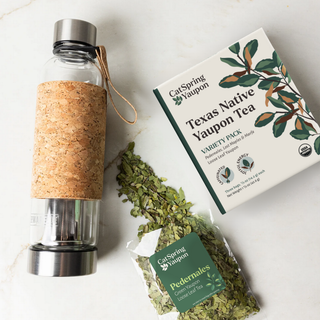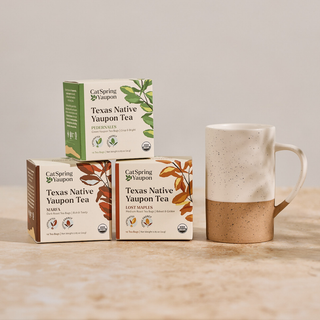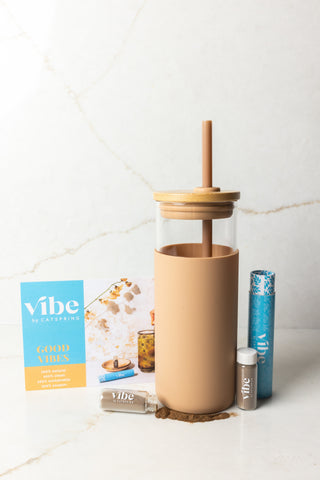Living with IBS can be frustrating. From painful stomach cramps to diarrhea to bloating to constipation, the right tea can help calm your stomach faster and provide symptom relief. In this guide, we’re diving into the best herbal teas for IBS, soothing your digestive system and enhancing your quality of life.
If you want to get some for yourself, we have a collection of the best teas for your tummy right here in tea bags, loose leaf, or iced tea pouches.
What is the Best Tea for IBS?
1. Yaupon Tea

Let’s start with yaupon tea, an under-the-radar gem that’s perfect for IBS sufferers. Unlike traditional caffeinated teas like black tea or green tea, yaupon is a low-FODMAP option that doesn’t aggravate your digestive tract. This tea is packed with antioxidants and offers a gentle caffeine boost without the jitters, making it a great choice for managing digestive symptoms without adding stress to your nervous system.
Benefits:
- Theobromine acts as a muscle relaxer to calm some of those pesky gastrointestinal symptoms.
- Decreased chronic inflammation via chlorogenic acid (CGA) that has anti-inflammatory properties.
- A boost for your immune system from the antioxidants that remove free radicals in your body.
Side Effects:
- May cause sleeplessness due to caffeine if large amounts of yaupon are consumed all at once.
Try our CatSpring Yaupon tea to calm IBS. It’s organic, non-gmo, kosher, sustainably grown, and naturally caffeinated.
Hot Tip: Brew your yaupon tea with hot water and enjoy it as part of your daily routine. Its anti-inflammatory properties can help reduce abdominal pain and other symptoms of irritable bowel syndrome.
2. Ginger Tea

Ginger tea has been used for thousands of years as a cure for nausea and digestive problems in regions like Asia and India. It is a staple in the world of herbal medicine, renowned for its ability to ease an upset stomach and improve gut health. Ginger’s anti-inflammatory properties can help reduce painful stomach cramps and bowel spasms, making it a go-to for IBS patients.
Benefits:
- Makes you feel better faster than ginger ale because it contains higher concentrations of the compounds that alleviate digestive issues.
- Made using fresh ginger root which packs a punch when it comes to healing symptoms of an upset stomach.
- Proven to reduce nausea when 1 milligram of ginger root is taken daily (based on a Thai study of pregnant women with symptoms of morning sickness).
Side Effects:
- Makes heartburn worse because it relaxes the muscle that prevents stomach bile from entering the esophagus.
How to Brew: Slice fresh ginger and steep in hot water for a soothing cup of tea. It’s a natural remedy that works wonders on the digestive system, promoting better movement of food through the GI tract.
3. Fennel Tea

Made from dried fennel seeds, fennel tea has oils that relieve gas, bloating, constipation, and abdominal pain. It originates in the Mediterranean though it is now found all over the world. It's long been used to improve digestion and has a relaxing aroma. Its essential oil contains compounds that can relax the muscles of the digestive tract, easing bowel symptoms and improving the overall function of the digestive system.
Benefits:
- Relaxes your muscles which improves digestive flow and can help remove toxins from your system.
- Improve sleep by relaxing your muscles, thereby allowing you to relax and unwind at the end of the day.
- Antibacterial properties can help support healthy microbiomes.
Side Effects:
- Some people may be allergic to Fennel so be sure and consult your doctor before trying.
Perfect Pour: Use pre-packaged tea bags or steep fennel seeds in hot water. Drinking fennel tea regularly can lead to positive results in managing digestive problems.
4. Peppermint Tea

Peppermint tea is a fan favorite among IBS sufferers. Known for its cooling effect, peppermint tea can help soothe the digestive tract and reduce symptoms like abdominal pain and bowel spasms. Peppermint oil capsules are also a popular option, but sipping a warm cup of peppermint tea can be just as effective and infinitely more comforting.
Benefits:
- Ease tense muscles as peppermint is a natural muscle relaxant to soothe irritated nerves and inflammation.
- Easy to complement the flavor with ginger, honey, or fruits to find a delicious cup for anytime.
- Relieve stomach pain and discomfort by relieving bloating, gas, and indigestion.
Side Effects:
- Can worsen acid reflux by relaxing the muscles around the stomach sphincter.
Brew Guide: Use fresh leaves or tea bags and steep in hot water. It’s a delightful, minty herbal remedy that can significantly improve your digestive health.
5. Chamomile Tea

Chamomile tea is primarily brewed from one of two daisy-like species of flower and commonly known for its stress-relieving properties. When it comes to calming both your mind and your digestive system, chamomile tea is unmatched. Chamomile’s anti-inflammatory and antispasmodic properties make it ideal for reducing stomach pain and other gastrointestinal symptoms associated with IBS.
Benefits:
- Promotes sleep due to its chemical structure, helping you relax and get that much needed rest.
- Its anti-inflammatory properties have been shown to boost your immune system.
- Ease nausea and soothe your stomach.
Side Effects:
- Chamomile does make you drowsy so be aware before consuming.
Sip Smart: Steep chamomile flowers in hot water and let the soothing powers of this herbal infusion work their magic. Incorporating chamomile tea into your daily routine can help manage stress and improve overall digestive health.
6. Turmeric Tea

Turmeric has long been used in India in various dishes and is known quite well for its distinctive yellow color caused by curcumin. Ongoing research is determining the effects of curcumin in turmeric tea but it may have antioxidant, anti-inflammatory, and antidiabetic properties, making it perfect for those with IBS and other functional gastrointestinal disorders. Turmeric can help reduce inflammation in the GI tract and improve symptoms like abdominal pain and bowel movement irregularities.
Benefits:
- No caffeine makes this a great bedtime option
- Stimulate blood flow which helps to flush out more of the toxins.
- Reducing inflammation can relieve inflamed tissues throughout the body and even improve skin appearance.
Side Effects:
- When consumed in high does turmeric tea can hurt some people's stomachs.
Golden Brew: Mix turmeric powder with hot water and a dash of black pepper to enhance absorption. This golden tea is not only a natural remedy for IBS symptoms but also a delightful addition to your tea collection.
7. Lavender Tea

Made by steeping lavender buds in hot water, lavender tea is known for its calming properties. It can also help soothe digestive issues. A floral aroma with hints of rosemary and mint, this is a great option for those looking for a caffeine free option that smells and tastes delightful. Most research so far has been done on lavender extract rather than lavender tea, though many of the benefits may be present in both.
Benefits:
- With anti-inflammatory properties, this tea can possibly help soothe irritated tissues.
- The smell of Lavender has also been shown to have a soothing effect and ease feelings of cramping.
- Causing drowsiness, Lavender can help promote a good nights sleep.
Side Effects:
- Be careful of taking Lavender tea with any other sedatives.
Lavender Love: Steep dried lavender flowers in hot water and inhale the soothing scent as you sip. It’s a perfect bedtime tea that can help you relax and improve your overall quality of life.
The Bottom Line

Incorporating these teas into a low-FODMAP diet and making lifestyle changes can lead to great results in managing IBS and enhancing your overall well-being. Owing to their amazing healthy-boosting properties, these are some of the best teas for IBS. They can help soothe symptoms of nausea, pain, and excess gas while treating gastrointestinal disorders, thereby improving your quality of life. So, brew up, sit back, and enjoy a comforting cup of tea. Here’s to a happier, healthier digestive system! 🌸🍵✨
If you want to get our best tasting tea for IBS, check out our organic, naturally caffeinated CatSpring Yaupon tea here.
Medical Disclaimer: This article is for informative purposes only and shouldn’t be taken as medical advice. If you have serious health-related issues you should reach out to a medical professional. While we have studied the scientific research available, this is not intended to diagnose, treat, cure, or prevent any disease.












